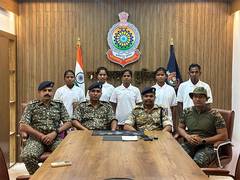Frequent elections huge burden on human resources, impede development: What Kovind said in 2018
New Delhi, Sep 1 (PTI) Over five years before being tasked with the responsibility to explore the feasibility of ‘one nation, one election’, Ram Nath Kovind as the country’s then president had made a strong pitch for debate and consensus among all parties on simultaneous polls.
Addressing a joint session of Parliament on January 29, 2018, Kovind had said citizens alive to the state of governance in the country are concerned about the frequent elections in one part of the country or another, which adversely impact the economy and development.
“Frequent elections not only impose a huge burden on human resources but also impede the development process due to the promulgation of the model code of conduct. Therefore, a sustained debate is required on the subject of simultaneous elections and all political parties need to arrive at a consensus on this issue,” he had said.
Again in his address to the first joint sitting of Parliament after the election of the 17th Lok Sabha, Kovind had made a strong pitch for ‘One Nation, Simultaneous Elections’.
“During the last few decades, due to frequent elections being held in some part of the country or the other, the pace and continuity of development programmes have been impacted,” he had said.
Noting that the people of the country have demonstrated “their wisdom by delivering a clear verdict both on state and national issues”, Kovind said that ‘One Nation, Simultaneous Elections’ was the need of the hour and that it “would facilitate accelerated development, thereby benefitting our countrymen”.
“With such a system in place, all political parties, according to their respective ideologies, will be able to better utilise their energy towards development and public welfare. Therefore, I urge all Members of Parliament to seriously ponder over this development-oriented proposal of ‘One Nation, Simultaneous Elections’,” he had said.
Kovind, 77, who served as the 14th President of India from 2017 to 2022, had also told all parties at a farewell dinner organised for him at Parliament’s Central Hall on July 23, 2022 to shun partisan politics to deliberate on what is essential for people’s welfare with the spirit of “nation first”.
Over a year after demitting office, the former President will now head a committee constituted by the government to explore the feasibility of ‘one nation, one election’.
Even after demitting office as President of India, Kovind has had an active public life and has been delivering lectures and attending various functions.
Only two days back, he met RSS chief Mohan Bhagwat who visited the former President’s residence here.
After the meeting, Kovind had said he had “a good conversation on various national issues”.
“His insights into our nation’s progress and values are truly inspiring,” Kovind had said after meeting Bhagwat.
Known as someone having risen from being a grassroots-level politician to becoming the country’s first citizen, Kovind in his speeches over the years has often referred to his humble background and talked about how he grew up in a mud house in a small village and that his journey to the presidency had been a long one.
Born in Paraunkh village in Uttar Pradesh’s Kanpur district, Kovind enrolled as an advocate with the Bar Council of Delhi in 1971 and served as counsel of the Union government in the Delhi High Court from 1977 to 1979.
In 1978, he became an advocate-on-record with the Supreme Court of India. From 1980 to 1993, Kovind was the standing counsel for the Union government in the apex court.
He was elected as a member of Rajya Sabha from Uttar Pradesh, effective from April 1994. He served two consecutive terms of six years each till March 2006.
Kovind was appointed the governor of Bihar on August 8, 2015.
He was the second Dalit to occupy the top constitutional post after K R Narayanan, who was the first Dalit president of the country from July 25, 1997 to July 25, 2002.






